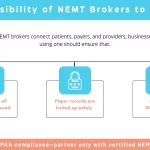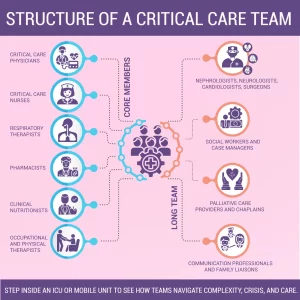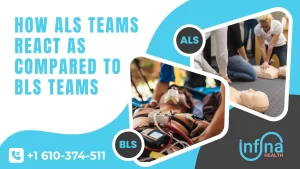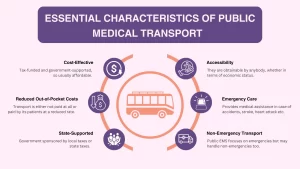Medical transportation companies have become an integral part of the healthcare system, providing essential services for patients who require assistance in traveling to and from medical appointments or during emergencies. As healthcare becomes more complex and the aging population grows, the demand for reliable and compassionate medical transportation services continues to rise.
In this blog post, we’ll address some important questions to consider before booking a medical transportation company. These questions will help you make informed decisions and ensure a safe and comfortable experience for you or your loved ones.
What is a Medical Transportation Company?
A medical transportation company is a specialized service provider that offers safe and reliable transportation for individuals who require assistance in traveling to and from medical appointments or during emergencies. Unlike regular transportation services, these companies focus on patients with specific health-related needs, such as those with mobility challenges, chronic conditions, or requiring medical care during transport.
Medical transportation can be divided into two main categories: emergency medical transportation and non-emergency medical transportation (NEMT). Emergency medical transport includes services like ambulances, which are equipped with medical equipment and staffed by trained emergency medical technicians (EMTs) to provide immediate care in critical situations. Non-emergency medical transport, on the other hand, typically involves transporting patients to routine medical appointments, physical therapy sessions, or dialysis treatments. These vehicles may be equipped with basic medical supplies and often include drivers or medical personnel trained in patient care.
The goal of a medical transport company is to ensure the patient’s safety, comfort, and well-being while getting them to their destination. Services are available for individuals who cannot drive themselves due to physical, mental, or medical conditions, providing a crucial service for those who need ongoing medical treatment or assistance with daily activities.
What Types of Medical Transportation Services Are Offered?
Medical transportation companies typically offer a range of services to cater to different patient needs. The different types are as follows:
Non-Emergency Medical Transportation (NEMT):
NEMT services are intended for patients who need assistance getting to and from medical appointments but do not require immediate medical care en route. This includes individuals with chronic conditions, disabilities, or those recovering from surgery who cannot drive themselves. NEMT services may involve vehicles equipped with basic support, such as wheelchair lifts, ramps, and securements to accommodate passengers with mobility challenges. Depending on the patient’s condition, drivers may be trained in basic first aid and CPR, though the transport itself is non-urgent.
Emergency Medical Transportation:
Emergency medical transportation is required for patients facing life-threatening situations or medical emergencies. This service typically involves an ambulance staffed by emergency medical technicians (EMTs) or paramedics. The vehicle is fully equipped with advanced medical equipment like defibrillators, oxygen tanks, and monitoring devices. Emergency medical transport is used when patients need urgent care during transit, such as those experiencing heart attacks, strokes, or severe trauma.
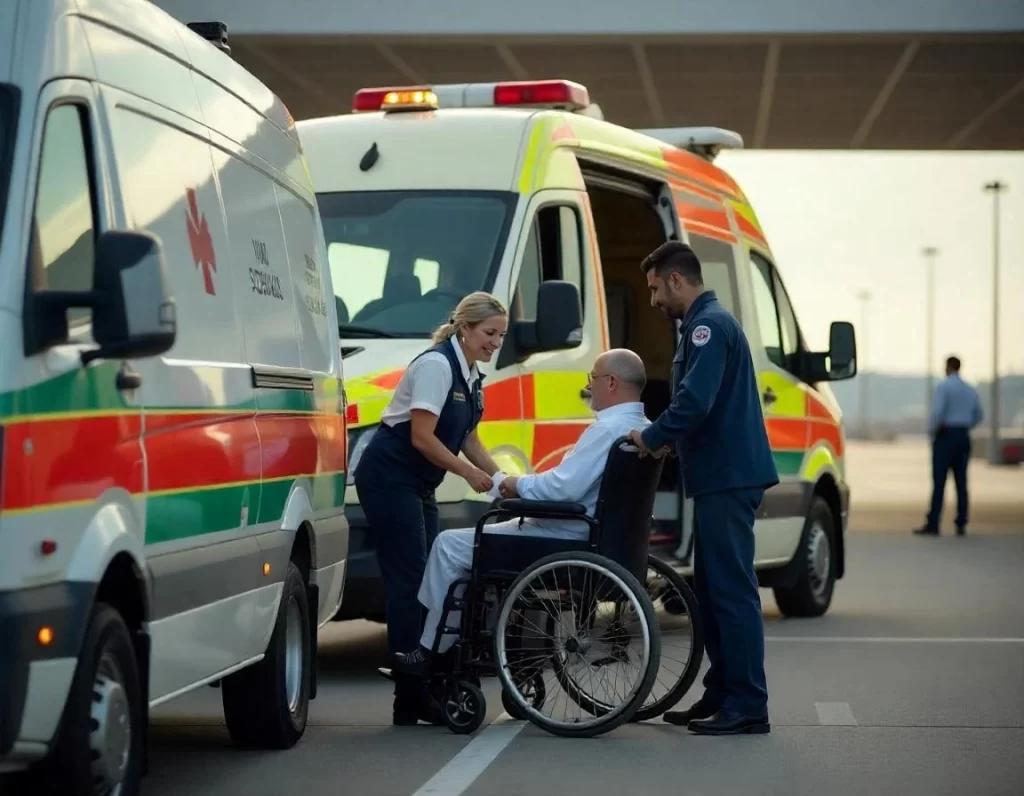
Two healthcare professionals helping an elderly person in a wheelchair during a medical transport.
Specialized Transport Services:
Many medical transportation companies also offer specialized services to accommodate specific patient needs:
-
- Wheelchair Transport: Vehicles equipped with wheelchair lifts or ramps for patients who cannot walk or stand.
-
- Stretcher Transport: Used for patients who need to remain in a lying position due to medical conditions or immobility.
-
- Bariatric Transport: Designed for patients who are overweight or obese, these vehicles offer wider and reinforced seating and additional support to ensure comfort and safety during transport.
Are the Drivers and Medical Staff Properly Trained and Certified?
When booking a medical transport service, it’s important to confirm that the drivers and medical staff are properly trained and certified to ensure patient safety and care during transport. Here’s what to look for:
1. Driver Certification and Training
Drivers should be trained in basic first aid and CPR to respond to minor medical issues during transit. They should have proper training in lifting, transferring, and securing patients, especially those with mobility challenges or in wheelchairs. In addition, drivers should be familiar with vehicle safety standards, including securement of medical equipment and patients.
2. Licensed Medical Professionals for Emergency Transport
Emergency medical transport should involve licensed paramedics or emergency medical technicians (EMTs) trained in life-saving procedures. They should also be skilled in using specialized medical equipment like defibrillators, oxygen tanks, and cardiac monitors.
3. Background Checks and Ongoing Training
Reputable companies conduct thorough background checks on all staff, including criminal history and verification of certifications. Also, look for a company where the medical staff receives ongoing training to stay current on emergency protocols, medical technologies, and safety practices.
How Does the Medical Transportation Company Ensure Safety During Transport?
When you’re booking medical transportation, safety should be a top priority, so asking this question is key. You want to be sure that the company takes proper steps to protect both patients and staff. Here’s what you should look for in their answer:
1. Vehicle Equipment and Securement Systems
It’s essential to ask about the securement systems in place. You should expect to hear that their vehicles are equipped with things like seat belts, stretcher straps, and wheelchair tie-downs. These features are designed to prevent unnecessary movement during the ride, which helps avoid any potential injuries. For emergency transport, the company should mention having advanced medical equipment, such as defibrillators and oxygen tanks, on hand to respond to critical situations. Asking this shows you’re thinking about the patient’s safety during the entire transport process.
2. Emergency Protocols
The company should explain that their staff is trained to respond to emergencies like cardiac arrest or respiratory distress, and that they follow clear emergency protocols. Many companies also have procedures for real-time communication with healthcare providers during transport to make sure care is adjusted as needed. Asking this ensures that you know their team is ready to act quickly if anything goes wrong.
3. Patient Comfort and Protection
You don’t just want your loved ones to be safe, you want them to be as comfortable as possible during their ride. That’s why it’s important to ask how the vehicles are equipped for comfort and protection. Look for answers that mention features like adjustable stretchers, wheelchair ramps, and wider seating for bariatric patients. A good company should also mention regular vehicle inspections to ensure the transport is both safe and smooth. This question highlights your focus on both the patient’s comfort and their well-being.
How to Book a Medical Transportation Service?
Booking a medical transportation service typically involves a straightforward process, but it’s important to understand a few key details before making your reservation.
1. Booking Timeline
It’s recommended to book medical transportation services as far in advance as possible, especially for non-emergency medical transport. Ideally, try to book at least 24 to 48 hours before the scheduled appointment. However, some companies may accept last-minute bookings depending on availability, particularly for emergency transport.
2. Booking Fees and Cancellation Policies
Many medical transportation companies charge a booking fee or require payment upfront for certain services. Additionally, cancellation fees may apply if a reservation is canceled within a short window, such as 24 hours before the scheduled time. Be sure to inquire about any applicable fees when making your reservation.
3. One-Time or Ongoing Services
Medical transportation services can typically be arranged for both one-time trips and ongoing needs. If you require recurring transportation, such as for dialysis or chemotherapy, many companies offer regular transport services at discounted rates or through subscription models to accommodate frequent trips.
Need a Safe and Comfortable Ride? Reach Out to Infina Health to Schedule Your Pickup.
How Does the Medical Transport Company Charge for Services?
Emergency and non emergency medical transportation companies may charge based on different pricing models, including a flat rate, hourly rates, or distance-based charges. Flat rates are often used for predictable, local trips, while hourly rates may apply for longer journeys or when additional time is required. Distance-based fees are commonly used for longer trips or when the transport covers a significant geographical area.
Does the Medical Transport Company Accept Insurance?
Many medical transportation companies accept insurance, but the types of insurance they accept may vary. Most commonly, they accept Medicare and Medicaid, especially for non-emergency medical transportation (NEMT) related to healthcare appointments.
Some companies also work with private insurance providers, but it’s important to check with the company to ensure your plan is covered. It’s also a good idea to verify that the service is medically necessary, as some insurance plans may only cover transport in specific situations.
Does the Medical Transportation Company Offer 24/7 Service?
Many medical transportation companies offer 24/7 service, ensuring that patients can access transport at any time, day or night. This is particularly important for emergency medical transportation, where immediate action is often necessary. For non-emergency transport, some companies may have specific hours of operation, such as during business hours or evenings, so it’s important to confirm the hours when booking.
What is Your Average Response Time for Emergency Medical Transport?
If you need emergency transport, knowing how quickly the company can respond is key. Many companies aim to arrive within 15-30 minutes for emergency situations, but response times can vary based on location, traffic, and the urgency of the situation. For non-emergency transport, response times may range from 1-2 hours or more depending on the scheduling and availability of vehicles. Asking this question helps you gauge how quickly they can mobilize in critical moments.
Does the Company Have Experience with Specific Medical Conditions or Needs?
When booking a medical transportation service, it’s essential to know whether the company has experience handling the specific medical needs of the patient. Conditions like Alzheimer’s, dialysis, cancer, or respiratory issues often require specialized care during transport. A reputable company will be able to tell you that they have experience transporting patients with these and other conditions. They should explain how they tailor their services to meet the unique needs of patients, whether it’s through providing a caregiver, ensuring the transport vehicle is equipped with the necessary supplies, or following specific protocols for comfort and safety.
What Happens if I Need to Cancel or Reschedule a Booking?
You’ll want to know how the company handles cancellations and whether they offer flexibility if you need to make changes. Many companies allow you to reschedule or cancel a booking, but the process and notice required can vary. Some companies might require a certain advance notice (e.g., 24-48 hours) for cancellations or rescheduling, while others may offer more flexibility for last-minute changes, especially in non-emergency situations. It’s a good idea to ask about both their cancellation and rescheduling procedures so you’re clear on what to do if the appointment time needs to change.
Conclusion
Booking the right medical transportation service is crucial for ensuring the safety and comfort of your loved ones. By asking the right questions, you can rest assured that you’re choosing a company that meets your needs and provides top-notch care. At Ifina Health, we pride ourselves on offering the best medical transportation services, with state-of-the-art equipment, highly trained staff, and a commitment to your loved one’s well-being.

